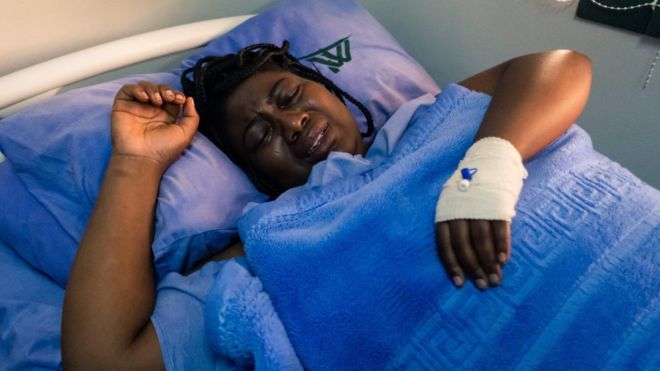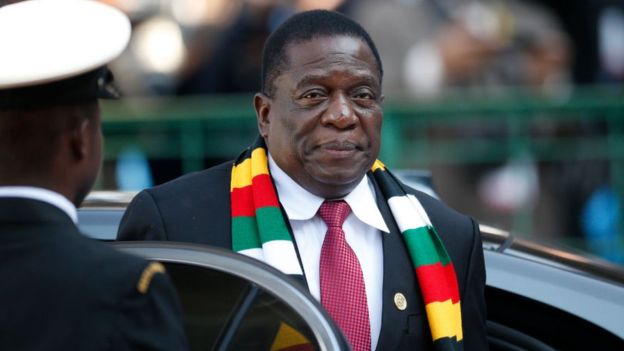President Emmerson Mnangagwa is accused of reneging on promises he made after ousting Robert Mugabe.
Source: Zimbabwe – once more on the brink of collapse? – BBC News
 Image copyrightAFP
Image copyrightAFPThe three women were in tears, distraught, and seemingly faint with hunger, as they sat in filthy prison uniforms in the dock in a magistrate’s court in Zimbabwe’s capital, Harare, waiting to hear if they would be granted bail.
In a country grappling not just with coronavirus but with a string of deepening economic and political crises – including rumours and denials of a coup plot – the extraordinary and deeply controversial case of opposition activists Cecilia Chimbiri, Netsai Marova and Joana Mamombe seems to point to something grim and fundamental about Zimbabwe’s current struggles: an overwhelming loss of public trust in its key institutions.
“We see a very jittery state that is at war with its citizens,” said Fadzayi Mahere, a spokeswoman for the opposition Movement for Democratic Change (MDC), who attended the bail hearing on Monday and argued that the women’s humiliation was part of an overtly political strategy to instil fear in the public.
The MDC activists are facing trial on charges that they lied about being abducted and sexually assaulted last month.
 Image copyrightGETTY IMAGES
Image copyrightGETTY IMAGESSpeaking from hospital after their ordeal, the women said unnamed state security agents had tortured them.
But a string of government ministers immediately accused them of fabricating their stories to discredit the government and to distract from the women’s own participation in an illegal protest march.
“The three women were part of a group of MDC youths that defied the lockdown laws in the country and took part in an illegal demonstration,” said the government’s information secretary Nick Mangwana.
‘Ugly, fractious legal case’
One deputy minister, who was later sacked, suggested the women, one of whom is a member of parliament, were prostitutes.
“The mask has fallen. They have no qualms about violating women and no interest in bringing the perpetrators to account,” said Ms Mahere.
But others in Harare have been left confused, and deeply cynical, about the allegations, unable to decide whom to believe.
“We’ve been tricked before. Nothing is as it seems,” said one hospital doctor, who often treats torture victims, but who asked not to be identified.
 Image copyrightEPA
Image copyrightEPAThis ugly, fractious legal case is playing out at a particularly tough time for Zimbabwe. The impoverished nation had seemed to be turning a corner three years ago, when President Robert Mugabe was forced out of power by the military and his successor, Emmerson Mnangagwa, promised tough economic reforms and a new era of transparency and accountability for the ruling Zanu-PF party.
But today, half the country’s population is struggling to feed itself, high inflation rates – which helped destroy the economy over a decade ago – have returned, and Zanu-PF has stopped telling the world that Zimbabwe is “open for business” and has reverted to its old habit of accusing unnamed Western nations of fomenting unrest and of conspiring with local critics to undermine the government and the economy.
Zimbabwe: Key facts
- 15.6 millionsize of population
- 63%live below poverty line
- 23%of children have stunted growth
- 785.5%official annual inflation rate in May
- 387coronavirus cases since March
- Fourcoronavirus-related deaths
Sources: WFP, Zimbabwe’s National Statistics Agency, Johns Hopkins University

“There is no coup in the making,” said Home Affairs Minister Kazembe Kazembe last week, blaming such “rumours” on an elaborate conspiracy between local and international forces.
His comments, presumably designed to reassure, appeared to have had the opposite effect.
“We are facing a storm. A perfect storm. We are going into state failure,” warned businessman Shingi Munyeza, during a recent Zoom call with a range of civil society activists alarmed about the deepening economic crisis and the threat posed by coronavirus.
Is another coup possible? The jittery mood in Harare has been compounded by a recent and controversial move by the security forces to seize the opposition’s headquarters, as well as by the unpredictable presence of troops on the streets apparently enforcing lockdown measures.
Any system built on weak foundations will always shake”

One of Mr Mugabe’s old allies, now in exile in South Africa (and accused of fuelling the rumours about another military intervention), said the situation was clearly fragile.
“It is a very unstable situation. Any system built on weak foundations will always shake. This regime was built on a coup,” said former minister Saviour Kasukuwere, accusing his old party, Zanu-PF, of “failing to deliver” on its promise of reforms.
‘Forced to drink urine’
In the meantime, Cecilia Chimbiri, Netsai Marova and Joana Mamombe are back in the notorious Chikurubi prison, on the edge of Harare, awaiting trial.
The magistrate denied them bail, arguing that the state had produced compelling evidence, including video evidence, against the women, and that the three might seek to flee the country if released.
Last week, speaking by phone from hospital, Ms Chimbiri said had been sexually assaulted and forced to drink urine by her abductors, but she insisted she and her colleagues were undaunted.
“Our freedom will not be granted to us on a silver plate,” said Ms Chimbiri.
Refusing prison meals
The MDC said the decision to deny the women bail was “extremely political,” and that an appeal was being prepared.
On Tuesday, at a national prayer service, President Mnangagwa urged Zimbabweans to repent “in the face of this deadly coronavirus pandemic”, and to fight against injustice and corruption.
“Forgive us for every act of injustice or corruption that has made the poor suffer or innocent to die.
“Forgive us as individuals and as a nation even for the sins of which we may be unaware,” he said.

Meanwhile, Amnesty International has condemned what it calls “an escalating crackdown on the right to freedom of expression and the criminalisation of dissent” in the country.
After the court appearance, the three women – one of them barely able to walk – were escorted back to a prison van and returned to prison.
Citing fears of being poisoned, they have refused to eat prison meals, and are relying on whatever food the authorities permit their relatives and supporters to bring to them.
The post Zimbabwe – once more on the brink of collapse? appeared first on Zimbabwe Situation.